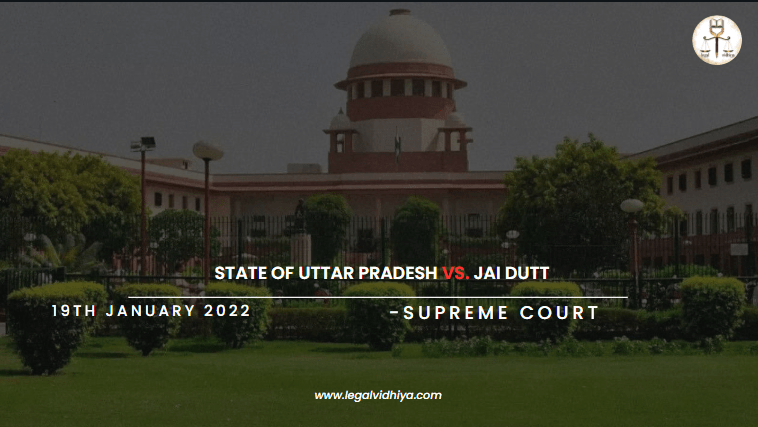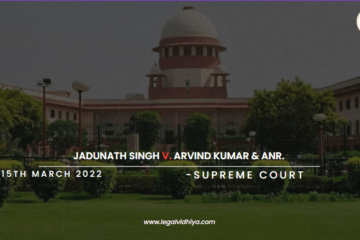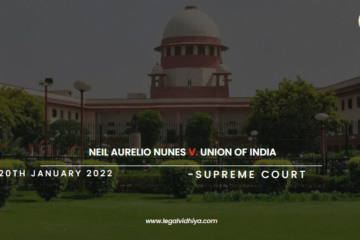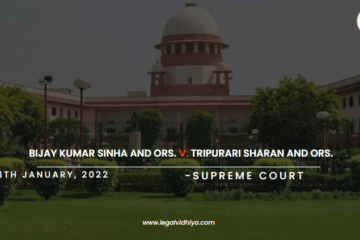
| CITATION | (2022) 3 SCC 184 |
| DATE OF JUDGMENT | 19th January 2022 |
| COURT | Supreme Court of India |
| APPELLANT | State of Uttar Pradesh |
| RESPONDENTS | Jai Dutt and Another |
| BENCH | M.R. Shah and B.V. Nagarjuna, JJ. |
INTRODUCTION
The case of State of Uttar Pradesh vs. Jai Dutt involves a pivotal legal dispute heard by the Supreme Court of India. Dated January 19, 2022, the case addresses the appeal filed by the State of Uttar Pradesh against the accused, Jai Dutt, and another. The Supreme Court bench comprising Justices M.R. Shah and B.V. Nagarjuna delivered a judgment differentiating S.302 and S.326 of IPC. By settling this almost 4 decades-old murder case where two of the accused already passed away at the time of the judgement.
FACTS OF THE CASE
- On 20-12-1983 evening all four accused persons entered the field of the deceased, Ram Autar who was working in his agricultural field when all the accused persons arrived and started verbally abusing him. The accused persons physically assaulted the deceased, using different weapons during the attack.
- The deceased sustained multiple injuries from the beating, and due to his serious condition, he was later taken to a hospital in Lucknow. After approximately six days, the deceased succumbed to the injuries and passed away.
- All accused persons were charged under Section 302(murder) read with Section 34(common intention) of IPC, except Accused 1 Jai Dutt, who faced charges under Section 302 of IPC.
- Eyewitnesses PW 1 and PW 2 testified to the incident. PW 8, Dr. P.R. Mishra provided the post-mortem report as evidence.
- Jai Dutt was convicted under Section 302 of IPC, receiving a life imprisonment sentence. Lal Bahadur, Sher Singh, and Shastri were convicted under Section 302 read with Section 34 of IPC, and also received life imprisonment.
- Dissatisfied with the trial court’s decision, all accused appealed to the High Court. Lal Bahadur and Sher Singh passed away during the appeal, leading to the abatement or removal of the two persons from the appeal. The High Court partially allowed the appeal for Jai Dutt and Shastri, converting the conviction from Section 302 read with Section 34 of IPC to Section 326 of IPC (grievous hurt) citing the reason that there was no head fracture for the deceased.
- The High Court imposed a two-year sentence for the offence under Section 326 of IPC. The court stated, “The incident occurred about 36 years back and therefore imposing two years’ sentence would be sufficient to meet the ends of justice.”
- The State, unhappy with the High Court’s decision, filed the present appeal.
ISSUES RAISED
- Whether the high court’s decision to convert the conviction under to conviction under grievous hurt justified?
- Whether the injury to the head amounts to murder or grievous hurt?
- Whether internal injury(ies) leading to death, sufficient grounds for murder?
Legal provisions
Section 302 (punishment for murder): “Whoever commits murder shall be punished with death or imprisonment for life, and shall also be liable to fine.”
Section 326 (voluntarily causes grievous hurt): “Whoever….., voluntarily causes grievous hurt….., shall be punished with imprisonment for life or with imprisonment….., which may extend to ten years, and also with a liability to pay a fine.”
Section 34 (Common Intention and Joint Criminal Liability): “When a criminal act is done by several persons in furtherance of the common intention of all, each of such persons shall be liable for that act in the same manner as if it were done by him alone.”
CONTENTIONS OF APPELLANT
- The appellant, represented by Shri Rana Mukherjee, contends that the High Court made a significant error by converting the conviction from Section 302 IPC to Section 326 of IPC in this case.
- Shri Mukherjee argues that the High Court acknowledged the accused’s guilt. Stating that the accused instigated a quarrel in the deceased’s field, used weapons, and caused injuries. The eyewitnesses (PW 1 and PW 2) were deemed trustworthy, reinforcing the case against the accused.
- Shri Mukherjee asserts that despite the acknowledgement of guilt, when the deceased succumbed to head injuries, constituting a clear case of murder, the High Court unjustly converted the conviction to Section 326 of IPC. The High Court’s justification for the conversion is based on the delayed death of the deceased after six days. He argues that this alone should not have been sufficient grounds for the change in conviction.
- The appellant maintains that the High Court overlooked the crucial details of the injuries mentioned in the post-mortem report and the cause of death. Shri Mukherjee emphasizes that the absence of a head fracture should not dismiss the possibility of convicting the accused under Section 302 of IPC, especially when internal injuries could lead to death.
CONTENTIONS OF REPONDENT
- Shri Salman Khurshid, the learned Senior Advocate contends that considering the circumstances, the absence of a head fracture in the deceased, the six-day gap between the incident and death, and the perceived non-serious nature of injuries, the High Court correctly acquitted the accused under Section 302 IPC and rightly converted it to Section 326 of IPC.
- He highlights that when the deceased was initially examined at the Primary Health Center (PHC) by Dr B.L. Katiyar, only simple injuries were observed. This, according to the defence, supports the argument that the case should not be classified under Section 302 of IPC, as determined by the High Court.
- The defence asserts that the incident was spontaneous, arising from a minor dispute, and there was no intention to cause the death of the deceased. Therefore, Shri Khurshid argues that the case should not be categorized under Section 302 of IPC.
JUDGEMENT
In this case, the post-mortem report revealed several injuries on the deceased Ram Autar, including scabbed abraded contusions on the head, scapular region, buttock, spine, and legs. Dr P.R. Mishra, who conducted the post-mortem, confirmed that the fatal injury was Head Injury 1, leading to the deceased’s death. Despite the deceased succumbing after six days, the court emphasised that this should not have been the basis for converting the conviction from Section 302 of IPC to Section 326 of IPC.
The court noted that the High Court failed to consider the severity of the injuries listed in the post-mortem report and wrongly acquitted the accused under Section 302 of IPC. It stated that causing injury to the head, a vital part of the body established a clear case for Section 302 of IPC. The court criticized the High Court’s reasoning, stating that the internal injuries leading to death were sufficient grounds for conviction.
Ultimately, the court set aside the High Court’s judgment, quashing the acquittal under Section 302 of IPC, and restoring the trial court’s decision. The accused, Jai Dutt and Shastri were convicted under Section 302 of IPC and Sections 302/34 of IPC, respectively, and sentenced to life imprisonment with fines. The appeal was allowed, and both accused were ordered to be taken into custody immediately.
Analysis
In this case, the court found that the deceased, Ram Autar, suffered severe injuries, especially to the head, leading to his death. Despite the gravity of the situation, the High Court wrongly downgraded the charges from murder (Section 302 IPC) to causing grievous hurt (Section 326 IPC). The court criticized this decision, stating that the focus should have been on the seriousness of the injuries, not just the time between the incident and the victim’s death.
The judgment highlighted the inadequacy of the High Court’s consideration of the post-mortem report, emphasizing that the absence of a visible head fracture did not diminish the severity of internal injuries. As a result, the court set aside the High Court’s decision, reinstating the original murder charges. The accused were sentenced to life imprisonment, underscoring the court’s commitment to addressing the gravity of the crime.
CONCLUSION
In this case, the court reversed the High Court’s decision that downgraded charges from murder to causing grievous hurt in a brutal assault resulting in the death of Ram Autar. The court emphasized the severity of internal injuries, particularly a fatal head injury, disapproving the High Court’s reliance on the time between the incident and death.
The post-mortem report played a crucial role in highlighting the extent of injuries suffered by the deceased. The court criticized the High Court for insufficiently considering these details, stressing that the absence of a visible head fracture does not diminish the gravity of internal injuries.
As a result, the court reinstated the original murder charges, sentencing the accused to life imprisonment. This underscores the court’s commitment to addressing the gravity of the crime and ensuring justice prevails.
REFERENCES
- State of U.P. v. Jai Dutt, (2022) 3 SCC 184
- Indian kanoon – https://www.indiankanoon.org
- Live law – https:/www.livelaw.in-state-of-up-v-jai-dutt-19-jan-2022
This Article is written by Chinthaginjala Karthik student of Damodaram Sanjivayya National Law University, Visakhapatnam (DSNLU); Intern at Legal Vidhiya.
Disclaimer: The materials provided herein are intended solely for informational purposes. Accessing or using the site or the materials does not establish an attorney-client relationship. The information presented on this site is not to be construed as legal or professional advice, and it should not be relied upon for such purposes or used as a substitute for advice from a licensed attorney in your state. Additionally, the viewpoint presented by the author is of a personal nature.




0 Comments